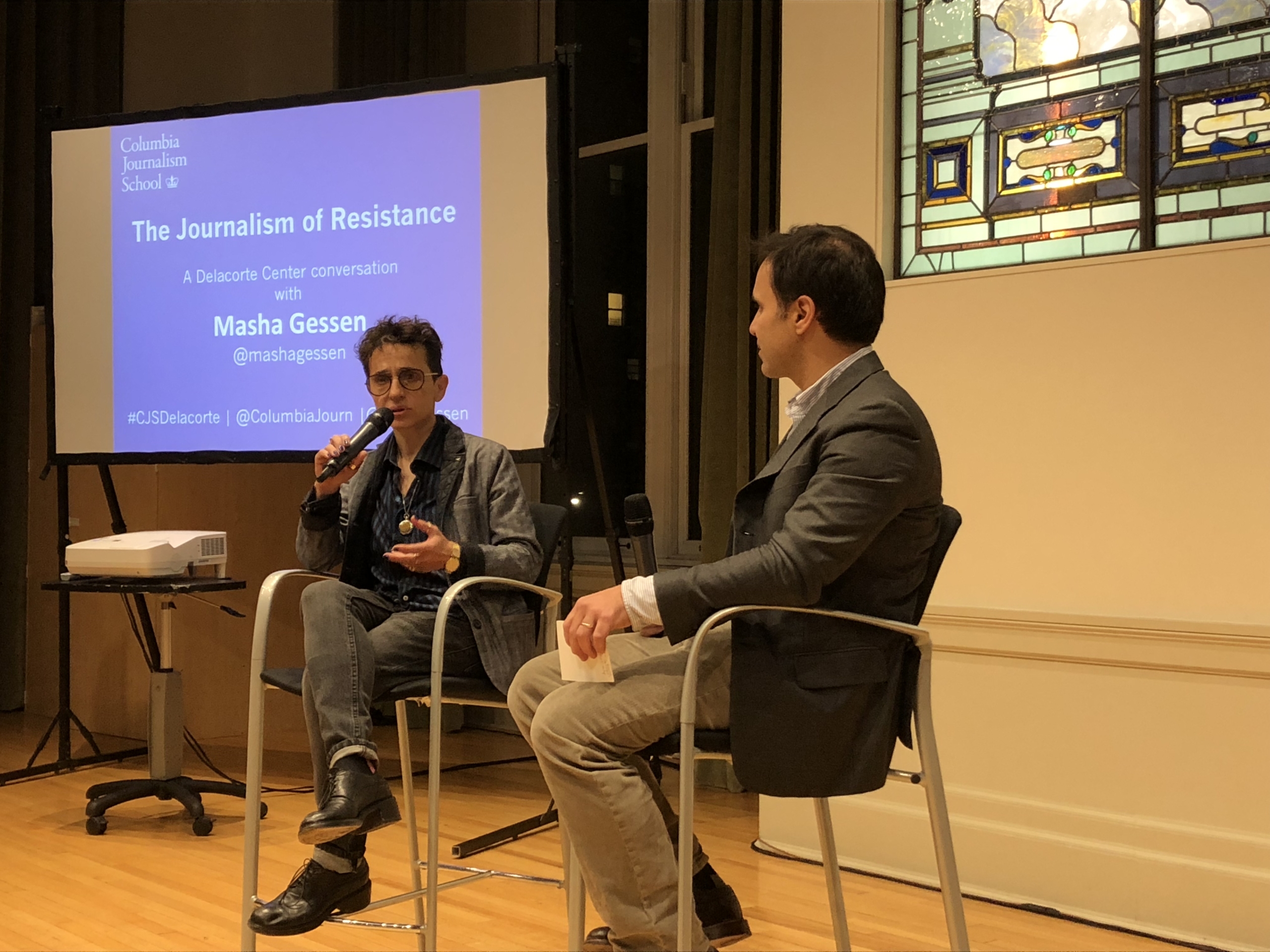American journalism outlets often miss the point on Russia, according to New Yorker staff writer Masha Gessen, and they’re not doing an excellent job of navigating the myriad dilemmas of the Trump era, either.
Gessen addressed a crowded lecture hall at Columbia Journalism School on Thursday evening, as part of the Delacorte Lecture Series. In an insightful and at times wryly comic exchange with Professor Keith Gessen, her brother, Gessen spoke about her early work in America’s gay press, her transition to foreign correspondence and Russian media, and what covering Putin’s Russia taught her about autocracy.
Gessen, who won the National Book Award for 2017’s “The Future is History: How Totalitarianism Reclaimed Russia,” became interested in storytelling at an early age, in part due to the influence of family members who were also writers. “As you know,” she began, addressing her brother, “I’m a fifth-generation journalist. And so are you.” In the 1980s, amid America’s AIDS epidemic, Gessen began work at a gay newspaper in Boston, where journalism was a necessarily political act. “I’m not afflicted with this idea that there is a view from nowhere, or that objectivity means presenting two equidistant points of view,” Gessen said.
In 1991, on the eve of the Soviet Union’s collapse, she returned to Moscow—a city she left with her family at 14—to cover developments in the region for a host of American magazines, later joining the Russian press. It was an exciting time, when all aspects of Russian life seemed up for discussion, Gessen said, including journalism: “There was a widely shared understanding that journalism was being invented.”
Upon Russian President Vladimir Putin’s initial rise to power in 2000, however, Gessen saw the country’s liberal reforms rolled back. As Putin took control of national media and set about dismantling the country’s electoral system, Gessen—serving by then as Moscow bureau chief for US News & World Report—forecasted the country’s democratic decline. Prescient though she may have been, she struggled to be taken seriously by western editors, at a time when the prevailing narrative in the US held Putin as a well-intentioned reformer.
If Gessen’s own alarm-sounding was once criticized as hysterical, today it’s the bulk of the American press which has become overwrought vis-à-vis Russia, she said. “It’s always desirable for a country going through turmoil to have an imaginary villain that explains everything,” she explained. “Having a villain that explains a little but not everything, not by a long shot, is just not as satisfying.”
This has led to an overabundance of unnuanced takes on Russia’s role in American political life, Gessen said, at the expense of more urgent stories, including the deregulation of American industries, Trump’s war on immigrants—which, even despite a glut of stories on the subject, is under-covered, in Gessen’s view—and a deeper look into the people who actually installed Trump in the White House: Americans.
“The basic narrative is that these people are misguided, misled, not terribly intelligent, and that if they had better information they would have voted differently,” Gessen said of media dispatches from Trump country. Such simplistic portrayals fit neatly with the Russian disinformation storyline, but they often fail to capture the nuances of a broader story about endemic disillusionment with the American electoral system, she said.
In the immediate aftermath of Trump’s election in November 2016, Gessen penned an essay for The New York Review of Books, entitled “Autocracy: Rules for Survival.” In it, she leveraged what she saw in Putin’s Russia—which she fled in 2013 amid peaking anti-gay rhetoric and threats to her family—to provide a sober portrait of what lay ahead for the United States. “Believe the autocrat,” she wrote. “He means what he says. Whenever you find yourself thinking, or hear others claiming, that he is exaggerating, that is our innate tendency to reach for a rationalization.”
She warned further in the piece that journalists might soon face a dilemma that is common under autocratic regimes, the need to fall in line at risk of penalty, a point underscored by the White House’s decision Wednesday to suspend Jim Acosta’s credentials, after a testy exchange between the CNN reporter and the president. “When a political leader puts journalists in a position of choosing between loyalty and access, he always wins, and journalists always lose,” Gessen said. “We can talk about how to minimize the loss, but it is certainly a net loss.”
Indeed, there are few good answers for journalists in the Trump era. Does one fail to cover the tweets of the president, or engage with lies and hate that should have no space in the public sphere? But there are clear wrong answers, Gessen said, citing cable news networks that featured commentary from White House press secretary Sarah Huckabee Sanders on election night Tuesday, despite the news having nothing immediately to do with the White House. “Why go for comment to somebody who lies on the record on a daily basis?” Gessen said. “It’s uninformative, and it’s degrading to you.”
That is not to say that journalists do well to think of themselves as expressly opposed to the Trump team. Asked by one student about the title of her lecture, “The Journalism of Resistance,” Gessen said she does not view her journalism as activism. Moreover, most journalists representing prominent outlets likely aren’t under enough direct pressure to claim membership in the so-called “#Resistance.”
“When I came in and saw the sign, I looked at my brother and said, ‘Did you call it that?’”
“I thought it was a good title!” Keith Gessen defended, laughing.
“Well,” Gessen said. “This is the problem when we don’t write our own headlines.”
Andrew McCormick is an independent journalist and former CJR Delacorte Fellow. His work has appeared in the New York Times, The Atlantic, the South China Morning Post, and more. Follow him on Twitter @AndrewMcCormck.

